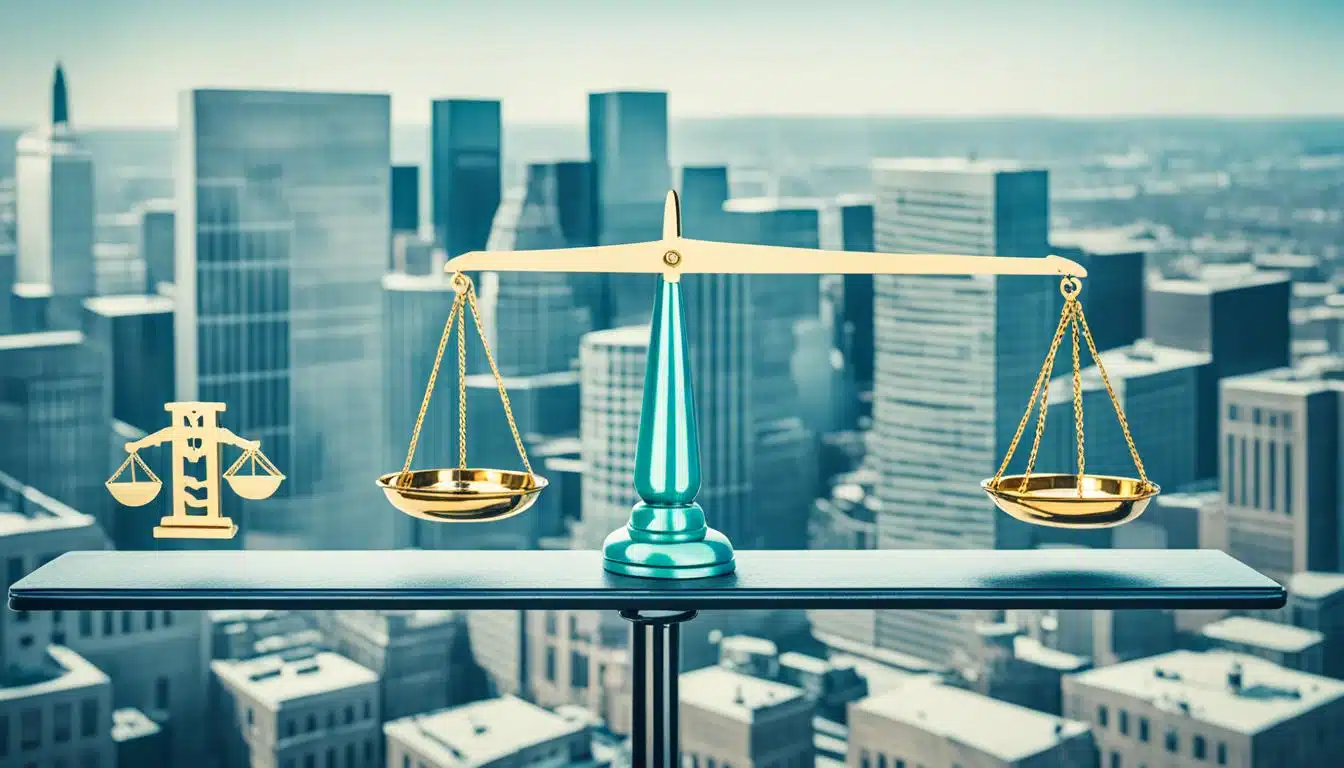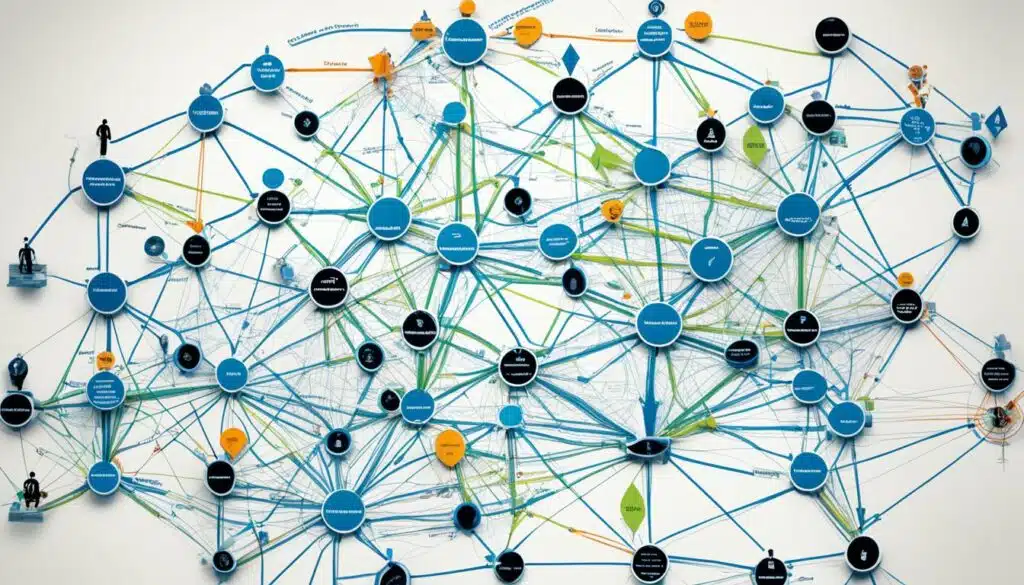A jurisdiction’s legal system is the set of rules and institutions a community has. It uses this to explain and enforce their laws. The legal structure varies by place. Each area has its system, not a single worldwide one.
This means laws can differ based on where you are. Jurisdictions have unique ways of creating laws and dealing with legal matters. They might use common law, civil law, or other systems. The way a legal system is made impacts how it’s used.
Other things that shape legal practices include history, culture, and education. The independence of judges and the setup of legal institutions matter too. All these parts make up how law is practiced in a specific area.
Key Takeaways : Jurisdictions Influence Legal Practices
- Jurisdictions have their own unique legal systems that can be based on common law, civil law, or hybrid systems.
- Lawmaking processes, the role of case law, and the influence of historical and cultural factors shape legal practices within a jurisdiction.
- Judicial independence, court structures, and administrative institutions play a crucial role in legal decision-making.
- Legal education and professional standards impact the knowledge and conduct of legal practitioners.
- Jurisdictional differences can significantly influence the application and interpretation of laws.
Introduction to Jurisdictions and Legal Practices
Jurisdiction means the power a court has to handle cases and make rulings. Also, it refers to the area where a court or agency can make lawful decisions. Jurisdictional matters have three main parts: personal jurisdiction (if the court can listen to a case with certain people involved), subject matter jurisdiction (if it can rule on the issues brought up), and territorial jurisdiction (if it can enforce decisions on those involved).
Also Read : What Is The Purpose Of International Law?
Definition and Scope of Jurisdiction
Understanding the definition and scope of jurisdiction is crucial to know a court’s or government’s limits. This involves knowing about jurisdictional boundaries, legal jurisdictions, diversity jurisdiction, general jurisdiction, and specific jurisdiction. Picking the right jurisdiction is a key first step in any legal or agency case.
Legislative Framework and Lawmaking Processes
The legislative framework and lawmaking processes are big influencers on a jurisdiction’s legal system. Legislative authority picks which laws will apply, like statutory law or past rulings. The roles of legislative bodies, how laws are made, and what people believe are important all mold the legal system. Knowing a jurisdiction’s governing laws and legal reforms helps understand its laws.
Role of Case Law and Precedent
In systems like the United States, common law relies on case law and precedent. This means past court decisions shape current law. According to the stare decisis principle, lower courts must follow higher court rulings within the same area. This creates a binding precedent. Courts may also look at other jurisdictions as persuasive authority. Looking at subsequent case history is also how the common law tradition evolves.
Also Read : How Can An Environmental Lawyer Protect Natural Resources?
Types of Legal Systems: Common Law vs. Civil Law
The United States and other British colonies follow common law. This type of legal system relies on previous court decisions. This is known as stare decisis. It makes the law somewhat more consistent and predictable.
Characteristics of Common Law Systems
In countries like the U.S., common law is key. It values judicial decisions and the rule of law. Courts use past case law to make decisions. They also look to understand the meaning of laws.
Characteristics of Civil Law Systems
Most of the world uses the civil law legal system. Here, laws come from written statutory codes rather than court cases. In civil law, judges mainly apply already set laws. They don’t make new laws through cases.
Also Read : What Are Key Principles Of Corporate Law?
Hybrid Legal Systems
Some countries mix common law and civil law traditions. This creates hybrid legal systems. These mixes show the historical and cultural blending of laws. In these systems, multiple legal traditions can coexist, influenced by colonial pasts and international legal norms.
| Characteristic | Common Law Systems | Civil Law Systems |
|---|---|---|
| Primary Source of Law | Case law and judicial precedent | Comprehensive statutory codes |
| Role of Judges | Judges play a central role in developing the law through their interpretations and rulings | Judges are primarily responsible for applying and interpreting the codified law |
| Legal Reasoning | Inductive, based on the analysis of specific cases to establish general principles | Deductive, based on the application of general legal principles to specific cases |
| Precedent | Binding precedent, where lower courts must follow the decisions of higher courts within the same jurisdiction | Persuasive precedent, where prior court decisions may be considered but are not binding |
| Legal System Structure | Decentralized, with a hierarchical court system | Centralized, with a unified system of courts and legal codes |
Influence of Historical and Cultural Factors
The historical and cultural factors of a place greatly shape its legal system. This includes legal traditions and customs passed down over time. They come from the community and area’s unique local laws and cultural norms.
Also Read : What Are The Different Interpretations Of Law?
Legal Traditions and Customs
A region’s legal culture is built on its legal traditions and customs. These have grown over hundreds of years. They guide how law from different sources is understood and used.
Colonial Legacies and Influences
The colonial legacies and influences stay in many countries’ legal systems. Colonizers introduced new legal frameworks and institutions. These mixed the colonizers’ ways with the locals’ traditions, making a hybrid legal system.
These mixes are called legal transplants. They affect the legal pluralism and transnational legal practices now seen around the world, especially with globalization and legal reforms.
Judicial Independence and Decision-Making
The way a court system is set up really matters for judicial independence and decision-making. In the common law system, lower courts must follow the decisions of higher courts, known as stare decisis.
Judicial interpretations and creating legal precedents are key in both common law and civil law. But, how much weight they’re given can change. The power of court decisions can be mandatory or persuasive by law and case specifics.
The setup of a court hierarchy affects judicial discretion in statutory and constitutional interpretation. Judges might look at later case histories to help them decide. This is especially true when the law isn’t clear or is changing.
To wrap up, the court hierarchy and court structure, and the idea of judicial independence all shape how the law works. It’s vital to understand these factors to move through the legal world correctly. This also helps make sure justice is fair and equal.
Also Read : What Are Key Principles Of Corporate Law?
Administrative Structures and Legal Institutions
The way a place makes and follows its laws is very important. Government agencies, regulatory bodies, and other administrative entities handle this. They see to putting laws into action and making sure people stick to them.
These administrative structures and legal institutions are key to how public business runs. They lay down the rules and how things should be done in admin. The trustworthiness and how well things work here really influence how the law is carried out in an area.
Places with strong administration and legal bodies make sure laws are applied well and fairly. But, if there are issues with these groups, there can be problems. They might not follow the law correctly, be slow, or even misuse their power. This messes up how well the laws work in that place.
It’s key for businesses, people, and lawyers to know how administration and legal groups work. They should understand about government bodies and enforcement. This helps them follow the law and the rules where they do business or live.
Also Read : Comprehensive IP Protection With Justice Law
Legal Education and Professional Standards
The way we educate lawyers is very important. It shapes how much they know and how well they work. This affects the legal field as a whole. Law schools are the first step for people who want to become lawyers. They teach students everything they need to know about the law and how it’s applied.
Legal Education Systems
Every place has its own way of teaching law. In the U.S., law school lasts three years. There, students learn a lot about different aspects of the law. After law school, they have to pass a test to become a licensed lawyer.
Professional Ethics and Conduct
Learning about ethics is also key to being a good lawyer. Bar associations set rules and regulate the behavior of lawyers. These rules cover things like being honest with clients and fighting for their rights. Following these rules ensures lawyers work for justice and fairness.
FAQs
What is a legal system and how does it vary across different jurisdictions?
A legal system is a set of rules and institutions for interpreting and enforcing laws. Every place has its own legal system. The system in use affects how the law is applied.
How is jurisdiction defined and what are the key components?
Jurisdiction can be about a court’s power or the area it covers.
It involves if a court can hear the case and its authority over the issue.
Also, it looks at where the court’s orders apply.
How do legislative frameworks and lawmaking processes influence legal practices?
The laws of a place are shaped by how they make laws. This affects what rules apply in cases.
It includes the rule-making bodies, their powers, and their goals. They all help form and understand the laws.
What is the role of case law and precedent in different legal systems?
Common law uses past court decisions to make new ones.
The United States follows this through the stare decisis principle.
Civil law, however, relies more on written laws than past cases.
What are the key characteristics of common law and civil law legal systems?
In the United States, like in many places, common law is used. This means courts must follow previous decisions.
Most other countries use civil law, which focuses on written laws.
In common law, decisions build on top of earlier cases.
How have historical and cultural factors influenced legal practices in different jurisdictions?
A place’s laws reflect its history and culture. Some places mix these with laws from past rulers.
This creates unique legal systems that evolve from tradition and outside influences.
How do court hierarchies and judicial decision-making processes shape legal practices?
Court systems and how they make decisions are vital for law. Lower courts must follow higher ones.
This is true in common law. In both common law and civil law, new decisions affect future cases.
What role do administrative structures and legal institutions play in shaping legal practices?
Organizations and entities help put laws into practice. They explain and enforce laws.
They make sure that laws work in daily life and are followed.
How does the legal education system influence legal practices in a jurisdiction?
Legal education teaches future lawyers about laws and how to apply them. This influences how laws are used in practice.









